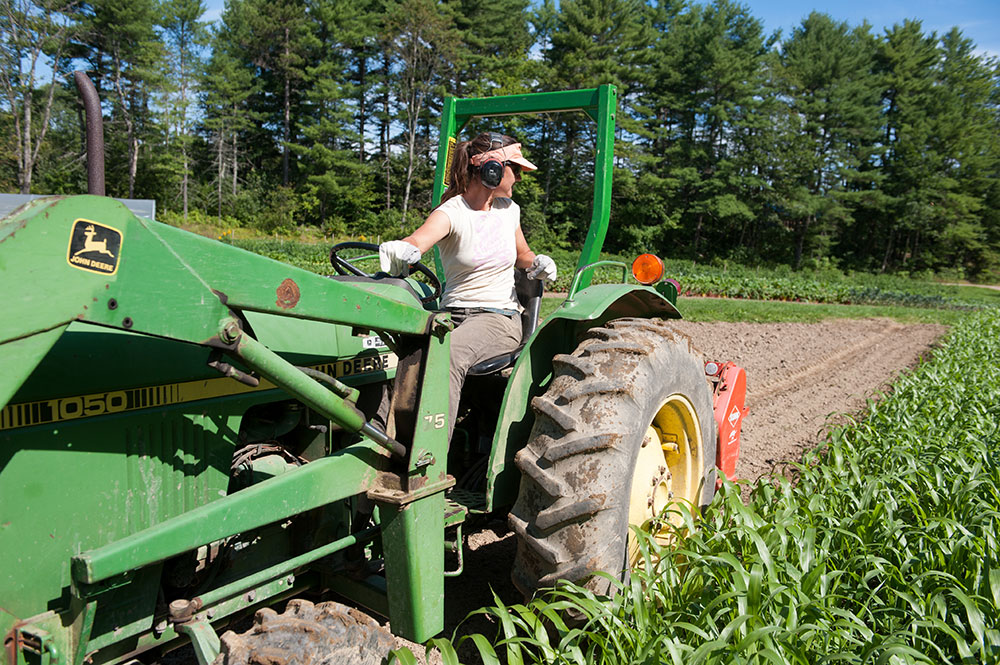The agricultural landscape of today is very different than it was 20 to 30 years ago. Farms today are getting fewer in number and the ones that are left are growing in acreage. However there is a small group that is growing rapidly. The “Small Farmer” is a term used for individuals who are practicing agriculture on a very small amount of acreage, usually under 100 acres.
Living on a small farm can be a life-long adventure. Small farms are also presented many challenges and circumstances that will affect their potential productivity and profit-ability.
Whether a person has been farming for a while or they are new to agriculture, Landowners want to attain a greater understanding of production practices and requirements, economics of land use choices, assessment of personal and natural resources, marketing alternatives and the identification of assistance.
In my role as an Extension professional, I work with many small acreage landowners on a day-to-day basis and the issues are always the same. It can be a very rewarding experience no matter what is being done with the land. It however does not go without saying that it can get overwhelming at times as well.
Whether you have been working with a current enterprise(s) or just beginning there are always things to think about. Things to think about could include but are not limited to:
Take Inventory: What resources do you have; personal and natural. Look at your property first.
- Look at your land – is it well drained, is it fertile, is it tillable or not etc. Is there crop land, forest, or pasture and hay? Next, do you have available water and how much? What is the source of that water? If irrigation is required can you or will you have to develop more water supplies through drilling a bigger well, a pond or accessing some other means of water such as a stream. Are there buildings and fences? What kind of buildings and what condition are they in? Will they be suitable for other enterprises?
- Does the property have any unique features? In other words, does the property have potential for get-away cabins, scenic hiking etc.? Does the location of the property have potential for an on-farm market? Availability/access to roads, utilities? A gas well?
- Look at your personal inventory – Do you have the necessary funds? What skills do you have? Can you and your family provide the necessary labor? Will your family provide some of the labor? Do you need training? Will you have the time to do what is necessary to “get the job done”? Are the labor requirements seasonal or spread evenly throughout the year? How often do you need to be “on-site”? How do the requirements match up with your lifestyle?
- Equipment – What do you already have? (Tractor, tillage, bush-hog, handling facilities etc.). What condition is it in? What would be needed for enterprises you are considering?
Can I buy used or is new equipment the only option.
Vision and Values: A farm is both an extension of the vision and values of the individual(s) involved. Where do you see your farm, family, industry in the next few years? What do you believe in as a business, individual, spiritually etc…? Your vision and values should help you establish a “Mission Statement” – this should represent the fundamental, underlying reason for existence of the business.
Objectives and Goals: Objectives can help outline how you want the business to develop and look like in the future. They help realize the mission. They are there to help plan, coordinate and motivate the farm. Goals are the “SMART” statements of what needs to be done to complete the objectives. “SMART” = Specific, Measurable, Attainable, Rewarding, and Timed.
Planning: New or existing farms need to have a well-designed business plan that takes into consideration individual infrastructure and financial needs, marketing strategies, production capabilities and knowledge needed to be successful.
Education and Experience: Preparation, knowledge, and training are essential. We never stop learning and growing. We need to be in a position to adapt quickly and to react to the unexpected, to persevere when factors beyond one’s control conspire against you, and knowing how/when/what/where to expend time, energy, and resources.
Managing risk: It is helpful to plan carefully to manage risk diversification, financial management, and the ability to withstand a couple of bad years.
Place Matters: “Out-a-site, Out-of-mind” may not be good for the overall marketing side of the business. Can you be creative in your marketing plan? Can you reach your customers effectively?
Start small: No matter whether you are a seasoned farmer or a new beginning farmer, it is always advisable to start small with any new enterprise to allow time for details to be worked out, for additional learning to occur, and to mitigate the size and scope of problems that will inevitably arise.
In conclusion: There is no one “Cookie Cutter” set of directions to be successful in farming. Whether you are seasoned or new to farming, whether you want a hobby, are looking to begin a different lifestyle or want to develop that true farm business, take the time to plan for success, gain a greater understanding of production practices necessary, economics of land use choices, assessment of personal and natural resources, marketing alternatives, and sources of assistance.
Finally, farm with confidence; choose something that you love to do, make good decisions based on facts, keep informed and plan for the future. For more information contact Tony Nye at nye.1@osu.edu.





